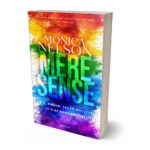Thirty-five years ago, I discovered an interesting fact. I was confronting my increasing migraine problem head-on, determined to understand and overcome its debilitating effect on me. Keeping a headache diary, I became very aware of the circumstances that would trigger an attack in myself. In addition to some common triggers, like alcohol and certain foods, I detected something I had never come across as a trigger. What I found was that when I expressed a strong emotion by crying, it would induce a migraine.
This insight went against the grain of my common sense. I knew that expressing emotions was a healthy activity. But I felt this happened so frequently that it needed to be looked at closer. I ventured to disclose this observation to the psychologist that I was seeing as part of my treatment at the time. Instead of taking it into consideration, he chastised me. “You have to allow yourself to cry,” he said, “it’s healthy to cry.”
As a result, I pushed that piece of information aside in my mind and began to dread any emotion that might bring about a crying incident, simply accepting what I knew would follow. At that time, I realized very little about my sensitive nature, other than that I was a sensitive person. And I certainly did not connect the two together.

Fast forward to today, the medical/scientific community still has not widely accepted that there is a connection between migraine and high sensitivity. Little, if any, research has been done on that possibility. But there is strong anecdotal evidence. As HSPs discover their true natures and begin to accept their traits as normal, they are beginning to find connections to other parts of their lives.
It makes sense that the two would be linked. HSPs’ nervous systems are more responsive to environmental stimuli. Smells, light, barometric pressure, etc. are external sources of stimulation common to both migraineurs and HSPs. Internal stimuli are also common to both. The big internal stimulation is emotional highs and lows.
As unique individuals, we all experience the various stimuli differently. This is because we have a one-of-a-kind bodymind (the structure that is the relationship between the body and the mind). Not every HSP will experience migraines, only those whose bodies are predisposed to them. But, if you are predisposed, you will also have different triggers, symptoms, and pain thresholds.
As a sensitive, you will be more reactive to any stimuli. We all know this from our personal experiences. My guess is that people who have gotten one or two migraines in their life tend to be of normal sensitivity. And those who struggle with the malady on a more frequent level are highly sensitive.
I am curious to know, if you have migraines, how you perceive this connection. Tell me your stories.
As for me, I eventually learned how to cope with the emotional upset migraine. I have worked on calming techniques my whole life (meditation, yoga, breathing, etc.) to help calm my nervous system in general. And, for those times when a strong emotion hits that requires crying, I use those techniques to temper the physical reaction to them. I have learned to self-talk my way through the emotion, still experiencing it, but moderating its expression so as not to excite and overwhelm my nervous system. As a result, I have fewer migraines following an emotional upheaval.
Copyright 2021, Monica Nelson

